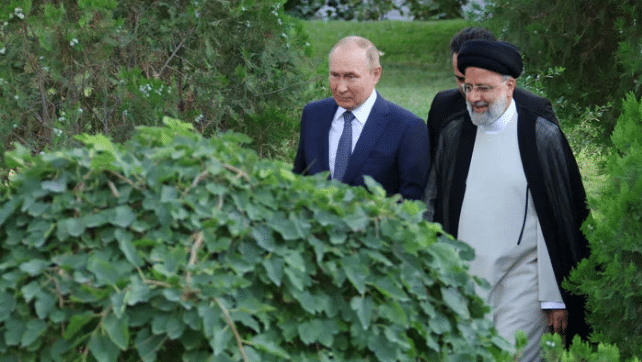Putin meets Iranian leader on first trip outside former Soviet Union since Ukraine war

Russian President Vladimir Putin held talks with Supreme Leader Ayatollah Ali Khamenei in Iran on Tuesday, the Kremlin leader’s first trip outside the former Soviet Union since Moscow’s February 24 invasion of Ukraine.
During his visit to Tehran, Putin will also hold his first face-to-face meeting since the invasion with a NATO leader, Turkey’s Tayyip Erdogan, to discuss a deal that would resume Ukraine’s Black Sea grain exports as well as peace in Syria.
Putin’s trip, which comes just days after US President Joe Biden visited Israel and Saudi Arabia, sends a strong message to the West about Moscow’s plans to forge closer strategic ties with Iran, China and India in the face of Western sanctions.
Footage of Putin’s meeting with Khamenei showed the Russian leader and the Iranian president sat together a few metres from the Supreme Leader, in a spartan white room. Only an Iranian flag and a portrait of revolutionary leader Ayatollah Khomeini could be seen in the background.
“The contact with Khamenei is very important,” Yuri Ushakov, Putin’s foreign policy adviser, told reporters in Moscow. “A trusting dialogue has developed between them on the most important issues on the bilateral and international agenda.”
“On most issues, our positions are close or identical.”
Both sanctioned
For Iran, also chafing under Western economic sanctions and at loggerheads with the United States over Tehran’s nuclear programme and a range of other issues, Putin’s visit is timely.
Its clerical leaders are keen to strengthen strategic relations with Russia in the face of an emerging US-backed Gulf Arab-Israeli bloc that could tilt the Middle East balance of power further away from Iran.
“Both our countries have good experience in countering terrorism and this has provided much security to our region,” Raisi said after talks with Putin. “I hope your visit to Iran will increase cooperation between our two independent countries.”
Emboldened by high oil prices since the Ukraine war, Iran is betting that with Russia’s support it could pressure Washington to offer concessions for the revival of a 2015 nuclear deal.
However, Russia’s increased tilt towards Beijing in recent months has significantly reduced Iran’s crude exports to China — a key source of income for Tehran since US President Donald Trump reimposed sanctions in 2018.
In May, Reuters reported that Iran’s crude exports to China have fallen sharply as Beijing favoured heavily discounted Russian barrels, leaving almost 40 million barrels of Iranian oil stored on tankers at sea in Asia and seeking buyers.
Ahead of Putin’s arrival, the National Iranian Oil Company (NIOC) and Russian gas producer Gazprom signed a memorandum of understanding worth around $40 billion.
Syria, Ukraine
High on the agenda in Tuesday’s trilateral talks that will also include Turkey will be efforts to reduce violence in Syria, where Erdogan has threatened to launch more military operations to extend 30-km (20-mile) deep “safe zones” along the border. Moscow and Tehran both oppose any such action by Turkey.
“Maintaining the territorial integrity of Syria is very important, and any military attack in northern Syria will definitely harm Turkey, Syria and the entire region, and benefit terrorists,” Khamenei told Erdogan. Read full story
Erdogan said terrorism remained a common concern and threat for Iran and Turkey, and the two countries needed to wage a battle against all threats, including Kurdish fighters in Turkey, Syria and Iran considered terrorists by Ankara.
Any Turkish operation in Syria would attack the Kurdish YPG militia, a key part of the US-backed Syrian Democratic Forces (SDF) that controls large parts of north Syria and is regarded by Washington as an important ally against Daesh.
A senior Turkish official said Turkey’s planned operation would be discussed in Tehran, as would reports that Russia and Kurdish forces were acting together in some areas of Syria.
Russia and Iran are Syrian President Bashar al-Assad’s strongest backers, while Turkey supports anti-Assad insurgents.
Putin, who turns 70 this year, has made few foreign trips in recent years due to the COVID-19 pandemic and then the Ukraine crisis. His last trip beyond the former Soviet Union was to China in February.
His bilateral talks with Erdogan will focus on a plan to get Ukrainian grain exports moving again.
Russia, Ukraine, Turkey and the United Nations are expected to sign a deal later this week aimed at resuming the shipping of grain from Ukraine across the Black Sea.





